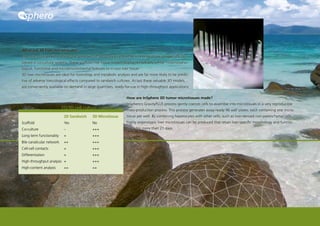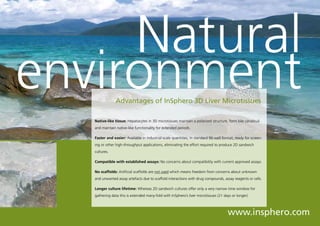Products toxicology web
- 1. 3D liver microtissues Toxicology Products Âŧ Liver-specific morphology and high functionality over 21 days Âŧ Chronic in vitro toxicity studies possible Âŧ Assay-ready, no cell culturing needed Âŧ No scaffolds, so no unwanted artifacts Âŧ Supplied in automation-friendly 96 well-format
- 2. What are 3D liver microtissues? Liver microtissues are multicellular spheroids of hepatocyte cells either in monoculture, or specially de- signed in co-culture systems. These scaffold-free tissue models display remarkably similar histomorpho- logical, functional and microenvironmental features to in vivo liver tissue. 3D liver microtissues are ideal for toxicology and metabolic analysis and are far more likely to be predic- tive of adverse toxicological effects compared to sandwich cultures. At last these valuable 3D models are conveniently available on demand in large quantities, ready-for-use in high-throughput applications. How are InSphero 3D tumor microtissues made? InSpheroâs GravityPLUS process gently coerces cells to assemble into microtissues in a very reproducible 2D/3D cell culture comparison mass-production process. This process generates assay-ready 96 well plates, each containing one micro- 2D Sandwich 3D Microtissue tissue per well. By combining hepatocytes with other cells, such as liver-derived non-parenchymal cells, Scaffold Yes No highly organotypic liver microtissues can be produced that retain liver-specific morphology and functio- Co-culture â +++ nality for more than 21 days. Long term functionality + +++ Bile canalicular network ++ +++ Cell-cell contacts + +++ Differentiation + +++ High-throughput analysis + +++ High-content analysis ++ ++
- 3. Natural environment Advantages of InSphero 3D Liver Microtissues Native-like tissue: Hepatocytes in 3D microtissues maintain a polarized structure, form bile canaliculi and maintain native-like functionality for extended periods. Faster and easier: Available in industrial-scale quantities, in standard 96-well format, ready for screen- ing or other high-throughput applications, eliminating the effort required to produce 2D sandwich cultures. Compatible with established assays: No concerns about compatibility with current approved assays. No scaffolds: Artificial scaffolds are not used which means freedom from concerns about unknown and unwanted assay artefacts due to scaffold interactions with drug compounds, assay reagents or cells. Longer culture lifetime: Whereas 2D sandwich cultures offer only a very narrow time window for gathering data this is extended many-fold with InSpheroâs liver microtissues (21 days or longer). ÂĐ HLPhoto - Fotolia www.insphero.com
- 4. Services Overview For feasibility studies or compound testing offers using our rat-liver microtissues please contact our sales department at sales@insphero.com Product Overview Assay-ready liver microtissues Assay-ready microtissues delivered in a specially coated, non-adhesive, 96-well V-bottom plate: Cat. # Name Description Cell source MT-02-001-04 rLiMT Rat liver microtissues formed by primary Wistar hepatocytes in co-culture with non-parenchymal cells InSphero AG MT-02-002-01 hLiMT Human liver microtissues formed by fresh Lonza Technoparkstrasse 1 human hepatocytes (homotypic culture) CH-8005 Zurich MT-02-002-03 hLiMT Human liver microtissues formed by cryo- Lonza Switzerland preserved human hepatocytes in co-culture with normal human dermal fibroblasts www.insphero.com Phone: +41-44-515049-0 e-mail: sales@insphero.com All technical and pricing information subject to change. All products are for research use only. They are not intended for any animal or human therapeutic or diagnostic use unless otherwise stated.



